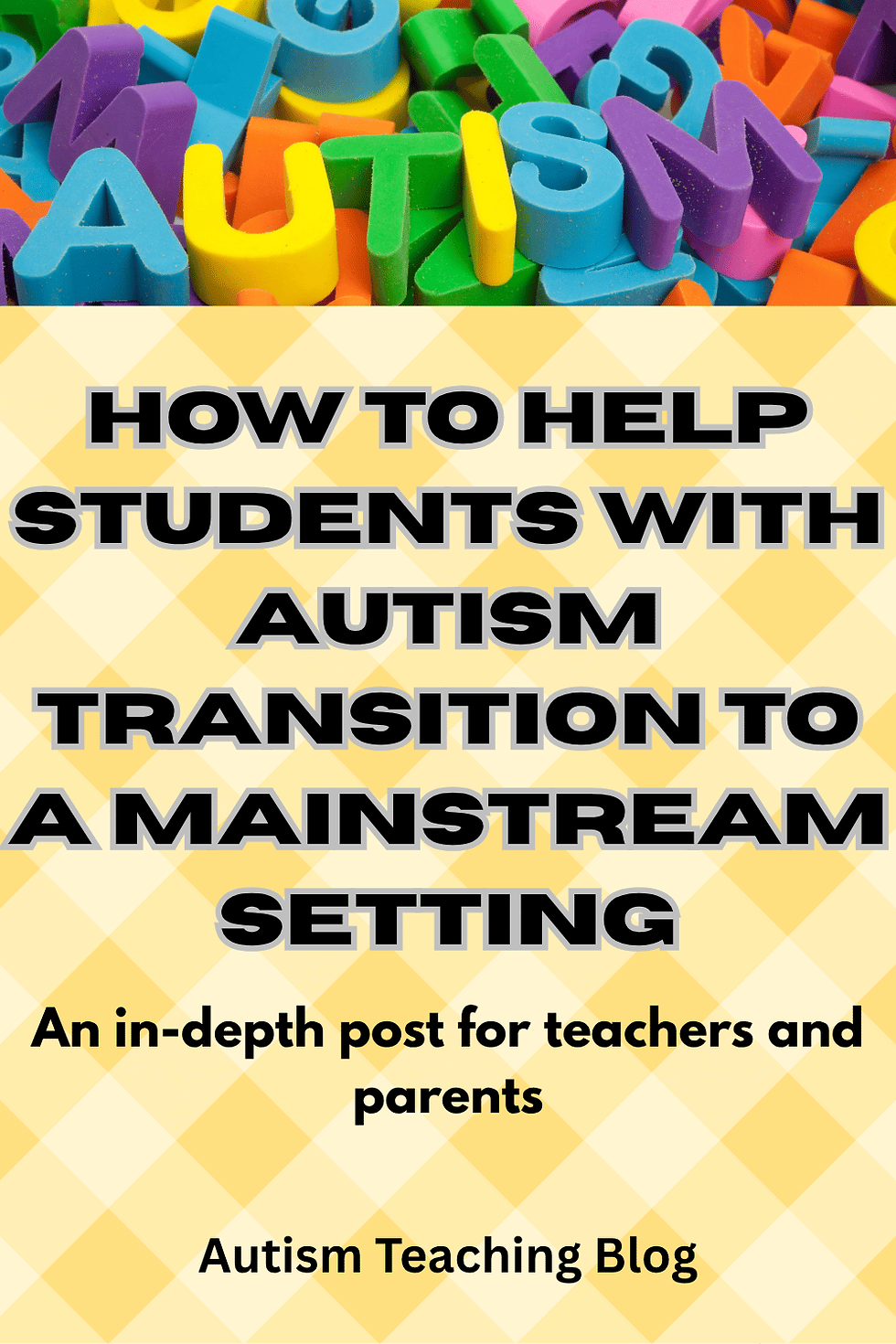How To Help Students With Autism Transition to a Mainstream Setting: What Skills to Focus on.
- Rosalie Markovics

- Oct 1, 2015
- 8 min read
Updated: Aug 7

Students with autism, who attend an autism specific school, will receive intensive learning to support the development of communication skills, social skills, and their ability to self-calm, as well as attending to the academic subjects. Some students will transition to a mainstream setting and the teacher should focus on preparing them for this transition in various ways.
I worked at a TEACCH school for students with autism and they had to transition to either a special setting or to mainstream when they turned 10.
What Skills to Focus on.
I will give you a snapshot of what we did to prepare the students in their last year with us as they stayed with us until they were 10 years old.:
Transition to sitting on the floor.
In special settings, students mostly sit on chairs as they have poor core strength to support their sitting. In the last year, we would introduce the children to sitting on the floor, as children do in mainstream. I worked in with the occupational therapist who had a program to develop the students’ core strength and we did this program for an hour each week. I was surprised to see how poor ALL the children’s core strength was and how much it developed throughout the year, with the consistency of doing the program each week.
Core strength is not apparent with all children as some may be able to sit on chairs for extended periods but are not able to kick a swinging ball when in a half reclining position. These same children also had difficulty with outdoor games, such as soccer and football. One child with very poor core strength avoided outdoor games with his peers, although he was working on a high academic level. Children know what they can’t do and they avoid it!!
You need to transition children from sitting on chairs to sitting on the floor. Involve your occupational therapist at school to help with this skill. If you teach in mainstream, consider allowing the child some time to sit on a chair, if they are consistently restless or showing signs of discomfort on the floor.
More recently, I was in a mainstream class with preparatory year students. There was one very difficult little student who was very disruptive and non-compliant but I did notice a few things about him, which rang those warning bells that he may be undiagnosed. I decided to use the strategies I practiced with my autistic students. One thing I noticed was his inability to sit still and his constant movement around the room, during floor time. I asked him if he would like to sit on a chair. You could see the look of relief flood his face and I couldn’t have asked for a better student from that point on. He sat and listened and participated in conversation and put his hand up to answer questions. Yet he was known for his difficult behaviour as the teachers did not know how to make accomodations for him!
You always need to look beyond the obvious and find the cause. Sometimes, we had difficult behaviours to manage in our autistic students and the answer to managing the behaviour was simpler than we had expected.
Walking in the community.
This skill would prepare the students for excursions, as well as more independence to and from school.
We took them for walks each week to develop their independence while walking and their knowledge of road and personal safety. When done weekly, the gains were quite significant as many children were driven in cars and buses and lacked stamina and independence in walking. Their parents also expressed a concern that their child might walk out of the gate at their next school, or run away.
As we walked, we taught them to look and listen for traffic before crossing. We crossed at corners where they had to be aware of traffic coming from a different direction. We stressed the importance of listening, as well as looking, so we walked along a busier road at a later stage, so the children could see unsafe situations e.g. fast drivers, and we could teach them to stay on the kerb. We repeated our language until it became familiar and then started asking children ‘Is it safe to cross?’ or "What do we do now?'
Then we started to walk in unfamiliar streets to generalize the skills. Some children also thought it was safe to hurry and would try to run across. So we talked about what could happen if you ran across. Lots of ‘what if’ situations came up while walking, and we could see the children who were developing the understandings we were teaching. Then we related these experiences to their day in their new school ie. daily experiences arriving and leaving, and when out on excursions.
This was a great relief to parents who knew that their child may have had no concept of danger and they were protected while growing up.

Communication between Schools and Involved Parties
Once their school had been agreed upon, the children started the transition process during last term. At this time, we would visit the school so we would be a familiar person for the child. There would be an ongoing process between the two schools about exchanging information about the transitions, like photos of the new class, teacher, and buddies, and work they did. Social stories and Show and Tell of their day are also reinforcing for the child.
The All About Me sheet was extremely important. There was a category for each important section that I wanted the student’s new teacher to know about the student. It can be written in the first person. It is more personal than a report and more fun as we put fun icons next to headings ie more child-oriented. Each child may not necessarily need an entry next to every heading so you can adapt it to the child.
Some mainstream teachers have not always had a positive approach to hearing they will have an autistic student in their class. I feel that the All About Me page helps them to better understand the student and gives the student a fair go. A student report does not give as much information and is more clinical in its approach.
All About Me sub-headings:
My name is……….and I am ……….years old. In my family, I have…………
My Likes
My Dislikes
Communication skills-Expressive and Receptive Skills
How do I express myself- Examples: independent, need supports with communication devices, augmentative, use of short sentences, can extend my sentences with sentence joiners e.g. and, difficulty with past tense.
Receptive: Examples: can follow directions using familiar/unfamiliar places and objects within/out of view but have difficulty with……
Personal Skills
Independence in living skills noted and skills being worked on, use of visual or written schedules to help with work or organisation of self.
Interpersonal skills-how do I function in a group or with another individual, greetings, asking for things, conversations.
Social skills- strengths and skills being worked on/difficulty with e.g. not coming first in sport. Any use of social stories to develop skills or procedure texts to explain how to do something and what will happen e.g. a trip to the dentist. Empathy and appropriate behaviour in different settings.
Mathematics
What I do well and things I struggle with.
The Arts
Take into account supports needed to complete activities. Likes and dislikes.
Health/PE
Health issues and how I act when unwell. Activities I do regularly at school/ home e.g. bike riding.
English-reading
Mention type of books read, how much text on page, recognition of high frequency words, schedule words, matching pictures to labels .
English-writing
Tracing or writing independently, what supports needed to write or use different text types/genres with scaffolds to support, or independent.
Fine motor skills
What supports were needed- daily practise with tracing and cutting, special implements regarding writing or cutting.
Sensory issues
Things that upset or distract. Calming skills.
OT issues/needs
Present focus- if any.
Speech Therapy
Skills being practiced.
Play skills
Competitive, good sport, can play in a group, board games, outdoor games, team participation, friendships.

Encourage more Independence in Organisational skills
Student’s Program- make sure they practice writing their name on activities and sheets.
Get them to be more independent with setting up their work station, getting items needed and packing away.
Find the student a way to get through his work tasks for each session e.g. does a mini-schedule work for him? it can be simple, written form and can add more or less detail, depending on the child. Does he need to check each activity off as he does it? Or can the activities or tasks be put in a pile and he works through the pile from top to bottom?
Social Skills
Teach them what to do if they are having a problem- asking for help when needed.
Putting hands up in class during group and whole class instruction.
What are the rules of the school they are attending-discuss these with the student.
I usually place a big emphasis on Play and try to prepare the children so that they can play successfully with other children, especially during play breaks. So I always put a big emphasis on being a good sport, following rules, turn taking, being able to play outdoor games and indoor games, such as board games, and sharing toys, construction activities, computer, iPad and games. Outdoor games could be both competitive and non-competitive.
Don't overlook simple outdoor Games that all children play, like skipping a rope, What's The time Mr. Wolf?, chasey type games, ball games, etc.
Working in with the Speech Therapist and developing conversation skills within a small group of children.
Doing errands and messages to expose them to unfamiliar people within the school and follow unfamiliar directions.
Working with the OT suggestions to develop any fine motor and gross motor issues.
The Academics
I was lucky to have taught in mainstream schools for many years before I taught in an autistic setting so I had a good idea of what was important for any child to know at certain grade levels and I tried to blend this with the child's ability.
I did focus on certain areas but this also did depend on the child's ability: book knowledge related to reading, developing semantic and syntactic cues systems, regular work on high frequency words, blending cvc words as whole word knowldege was often better than word attack skills, increasing whole word knowledge (sight vocabulary for days, months, colours, numbers, familiar objects and activities), answering and writing answers for simple text related questions (choosing correct answers from a list is a good start), doing basic book reports, using 5 W's, matching words to pictures or sentences to pictures, fill in missing words in sentences,understanding the basic processes in mathematics, time concepts, and measurement concepts related to size, positional language, and shapes, number work, such as before and after, counting by 5's, 10's, 2's.

Find out the academic expectations for the student’s level and, if needed, break that skill down and teach to it until he gets the basics. Then move the expectation up. Breaking skills down to earlier understandings is very important with autistic students and, if they master these understandings, they have a better chance of moving on in their learning.
I have seen successful transitions but I would like to stress that a child’s Social Skills are very important as having friends, forming good relationships, feeling confident and being able to make use of their leisure time constructively will enhance their lives.
To see my other posts, you can go back to Home Page here.
If you like my post please share it now.
.






















Comments